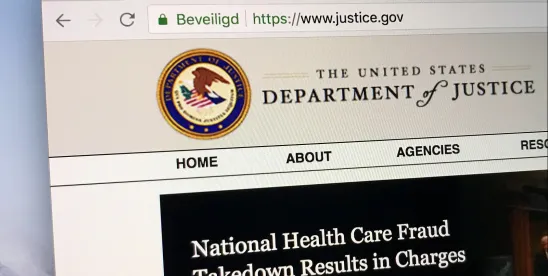In May 2025 the Department of Justice (DOJ) Criminal Division published its enforcement priorities, and the Civil Division has now followed suit with a memorandum of its own (the “Civil Division Memo”). It outlines five policy objectives that President Trump and Attorney General Bondi have directed the Civil Division to prioritize in their investigative and enforcement work:
(1) combatting discriminatory practices and policies;
(2) ending antisemitism;
(3) protecting women and children;
(4) ending sanctuary jurisdictions; and
(5) prioritizing denaturalization.
Each section identifies the Executive Order(s) and DOJ Memoranda that set forth the Trump Administration’s policy objective(s) in each priority area and describes the types of conduct that will be subject to enforcement, as well as some of the tools that DOJ might use in those efforts. This article focuses on the Administration’s stated objective of “protecting women and children,” which relates to several Executive Orders regarding gender identity and gender-affirming care and a related directive from Attorney General Bondi to the Civil Division describing DOJ’s intent to investigate certain manufacturers and distributors of puberty blockers, sex hormones, and other drugs.
The Civil Division intends to use the Federal Food, Drug & Cosmetic Act (FD&C Act), among other authorities, to undertake civil enforcement action against:
- manufacturers and distributors “engaged in misbranding by making false claims about on- or off-label use of puberty blockers, sex hormones, or any other drug used to facilitate a child’s so-called ‘gender transition’”; and
- “dealers,” such as online pharmacies, “suspected of illegally selling [ ] drugs” used in connection with gender-affirming care.
Because many of the hormones and other drugs used in gender-affirming care can be used to treat other clinical conditions, this enforcement directive could have wide-ranging impacts beyond the enforcement priorities explicitly identified by DOJ. For example, testosterone is a hormone commonly used in gender-affirming care, but it is also prescribed to treat patients with other, unrelated conditions, such as men with low testosterone. Manufacturers that produce this and other hormones will now be forced to consider the risk of civil investigation or enforcement when deciding which hormones (or other drugs) to manufacture and to which entities it will sell those products. Under the government’s current interpretation of the FD&C Act’s misbranding provisions, a wide array of factual circumstances can be used as evidence of a manufacturers or distributor’s intent to have a drug be used in an off-label manner by health care providers, even when direct off-label promotional activity is not at issue.
As directed by Attorney General Bondi, the Civil Division also will investigate false claims submitted to federal health care programs for any “non-covered services related to radical gender experimentation.” According to the Civil Division Memo, the Civil Division intends to use the False Claims Act (FCA) and other authorities to “aggressively pursue” health care providers that bill the federal government for “impermissible services,” by, for example, attempting “to evade state bans on gender dysphoria treatments by knowingly submitting claims to Medicaid with false diagnosis codes.” The Civil Division Memo does not explain why it believes that health care providers are actually submitting such claims.
Doctors, hospitals, pharmaceutical companies, pharmacies, and other entities that care for patients seeking gender-affirming care will be under heightened scrutiny from DOJ and other enforcement agencies seeking to ensure that federal health care program funds are not used in contravention of the Civil Division Memo and the various Executive Orders and memoranda on which it is based. It remains to be seen whether whistleblowers will see the Civil Division Memo as describing a new area of opportunity for qui tam lawsuits under the FCA, which is important because relators drive the vast majority of FCA-related enforcement activity. Given that the number of patients seeking such services is relatively small, and the number covered by federal health care programs (e.g., Medicaid or TRICARE) is even smaller, relators and relators’ counsel may not view cases based on the theories described in the Civil Division Memo as being as lucrative as other enforcement areas. State laws protecting the clinical judgment of doctors and other health care professionals also may pose an obstacle to this enforcement goal.
While the Civil Division Memo is notable for the specific areas of investigative and civil enforcement it identifies, it is likewise notable for what it does not describe. Many of the priority areas on which DOJ has focused its FCA enforcement efforts over the last many years (e.g., cybersecurity fraud, COVID-19-related fraud, other types of health care fraud) are not mentioned at all. Only time will tell whether the Civil Division Memo reflects an entire reorientation of DOJ civil enforcement or simply a prioritization of new enforcement areas on top of traditional areas of focus.







 />i
/>i
